Fifteen years ago, after a third crushing loss, it was widely assumed that the Conservatives would be out of power for a decade. With William Hague, Iain Duncan Smith and Michael Howard, the party did not have a record of picking winners. Then along came David Cameron. By 2010 he had gained 97 seats – 20 short of an overall majority, but enough to enter Downing Street with Liberal Democrat support and herald a decade of Tory dominance. If the next Labour leader could match Mr Cameron and win an extra 97 seats, then they too could walk into No 10 with coalition partners. But that would mean choosing the right leader.
In a system of government that concentrates power in the ruling party, the Tory political ascendancy is unhealthy. Labour’s next leader should be the person best able to make their party an attractive alternative. But first its leadership contenders must be able to convince members that their mission is to put Labour into government and create a sense that Boris Johnson could be vulnerable. This requires as wide and as deep a debate in Labour as possible. Labour suffered a shattering defeat at the general election last month and the party needs time to reassess its ideas and its policies, and to introspect about the reasons why it lost.
The GMB’s decision to back Lisa Nandy is therefore to be welcomed. The frontrunner Keir Starmer did not need the GMB’s vote: his was the first name on the formal ballot to become the next Labour leader, following the endorsement of both the shopworkers’ union, Usdaw, and Unison, the UK’s largest union. Unite, the other big trade union, is likely to throw its weight behind Rebecca Long-Bailey, who is seen as the keeper of the left’s flame. Party members have six weeks of auditions to sit through for the role of leader of the party. There had been a feeling that the frontrunners would tell members they had to change speed, rather than the direction of political travel. With Ms Nandy’s name on the ballot, this will no longer be the case. The contest will benefit from her presence.
The same is true of Emily Thornberry, perhaps the best parliamentary debater in the race. Once feted as a successor to Jeremy Corbyn, she has fallen out with those who once praised her. The shadow foreign secretary’s name will only go forward to the party membership if she can win 33 nominations from local Labour parties or get the backing of the Communication Workers Union. The Guardian hopes that she does so. Both Ms Nandy and Ms Thornberry would provide a stiff and necessary test for the favourites. After all, if Ms Long-Bailey and Mr Starmer cannot best party rivals, what hope do they stand of taking down Mr Johnson?
Infighting and a failure to understand Brexit’s reshaping of politics have strained Labour’s relations with voters. Casting the Tories as mean and selfish will be hard when Mr Johnson won’t play the part. The Labour party itself needs rebuilding, in Scotland and northern England. Whoever wins has to come to terms with the historic mistake of leaving the European Union – and understand which parts of it voters can live with and which to jettison. By being smart but not otherworldly, a new leader can give Labour hope and Britain a new opposition.














